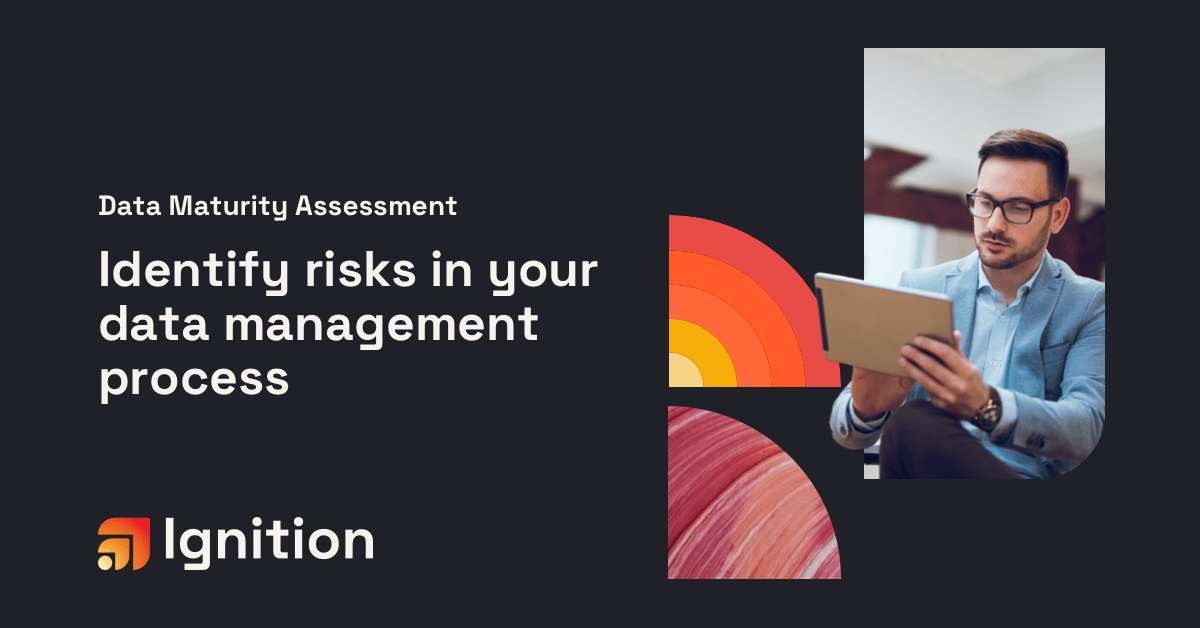In this article in our Data Driven Organisation Series, our Principal Consultant, Eoin Rock, delves into the five key factors that can help you determine if your organisation is well-prepared for AI adoption.
The rise of Artificial Intelligence (AI) and Machine Learning (ML) has ushered in a new era of possibilities for organisations across various industries. Businesses are increasingly exploring the potential of AI to enhance operations, boost productivity, and gain a competitive edge. However, embarking on the AI journey without thorough preparation can lead to missed opportunities and challenges. To ensure your organisation is poised for success in the world of AI, it's crucial to assess your AI readiness.
In this article, we will delve into the five key factors that can help you determine if your organisation is well-prepared for AI adoption.
1. Data Integrity and Accuracy
- At the heart of any successful AI initiative lies high-quality data. Data serves as the fuel that powers AI algorithms and models. Ensuring data integrity and accuracy is the foundational step in your AI readiness assessment.
Actionable Steps:
- Data Quality Checks: Implement a robust data governance framework that includes routine data quality checks. Identify and rectify inconsistencies, errors, and missing values in your datasets.
- Data Lineage Tracking: Establish a clear understanding of where your data originates, how it's processed, and who accesses it. Data lineage tracking helps maintain transparency and accountability.
- Data Cleansing and Normalisation: Invest in data cleansing and normalisation tools to standardise your data and eliminate discrepancies. This step is critical for maintaining data consistency and reliability.
A solid foundation of accurate and reliable data is essential for AI models to produce meaningful insights and predictions.
2. Identifying and Implementing the Right Tools
The success of AI initiatives heavily depends on the tools and infrastructure you choose to implement. Selecting the right AI-related tools that align with your organisation's technology stack is paramount to achieving seamless integration and optimal performance.
Actionable Steps:
- Technology Stack Alignment: Assess your existing technology stack and identify AI tools and solutions that seamlessly integrate with your systems. Compatibility with your infrastructure is vital to avoid disruptions.
- Stack Alignment: Assess your existing technology stack and identify AI tools and solutions that seamlessly integrate with your systems. Compatibility with your infrastructure is vital to avoid disruptions.
- Use Case Suitability: Evaluate the suitability of AI tools for your specific use cases. Different industries and functions may require specialized AI applications, so ensure that your chosen tools align with your objectives.
Choosing the right AI tools and technologies ensures that your organisation can harness the power of AI effectively, addressing its unique needs and challenges.
3. Cloud Ecosystem Health
AI models demand substantial computing power, making cloud infrastructure an attractive option for many organisations. However, the health of your cloud ecosystem plays a pivotal role in your AI readiness assessment.
Actionable Steps:
- Scalability: Assess whether your cloud infrastructure can scale seamlessly to accommodate the computing requirements of AI models, particularly when working with extensive datasets.
- Provisioning: Ensure that your cloud setup allows for easy provisioning and de-provisioning of resources based on workload demands. Flexibility in resource allocation is essential to optimise costs.
A healthy cloud ecosystem not only supports AI initiatives but also provides cost-effective scalability, making it a strategic choice for organisations looking to leverage AI.
4. Risk Management and Compliance
While AI promises tremendous benefits, it also introduces new risks and liabilities, such as biases in models or legal and regulatory implications. To mitigate these risks, organisations must establish robust risk management and compliance protocols.
Actionable Steps:
- Regular Audits: Conduct regular audits of your AI models to identify and rectify biases or errors that may have legal or ethical implications. Transparency in your audit processes is essential.
- Decision-Making Processes: Establish transparent decision-making processes that account for the unique risks associated with AI. Ensure that AI-related decisions are well-documented and traceable.
- Guardrails and Fail-Safes: Implement guardrails and fail-safes within your AI systems to prevent catastrophic events. These measures may include human oversight, performance thresholds, or emergency shut-off mechanisms.
By proactively addressing risks and compliance considerations, your organisation can navigate the complex landscape of AI with confidence and integrity.
5. Building a Robust AI Stack
Building a robust AI stack is the culmination of your AI readiness assessment. It involves defining clear goals, collecting and preprocessing high-quality data, building AI models using best practices, and deploying and monitoring them for continued accuracy and performance.
Actionable Steps:
- Clear Goals: Define clear objectives and use cases for your AI initiatives. Understanding the goals of your AI projects guides technology selection and resource allocation.
- Data Preprocessing: Collect and preprocess data meticulously, ensuring its quality and relevance. Explore data augmentation techniques to enhance the diversity and performance of your datasets.
- Model Development: Adhere to best practices in model development, including regularisation, hyperparameter tuning, and cross-validation. Building robust models is essential for reliable results.
- Deployment and Monitoring: Deploy AI models into production environments and establish monitoring systems to track their accuracy, speed, and scalability. Regularly retrain models to ensure they remain effective over time.
Assessing your organisation's AI readiness is a multifaceted endeavour that encompasses data integrity, tool selection, cloud ecosystem health, risk management, and AI stack development. By diligently addressing each of these factors, your organisation can embark on its AI journey with confidence and preparation. In the rapidly evolving landscape of AI, those who are well-prepared stand to gain a competitive advantage and unlock a world of innovation and possibilities. As you navigate this transformative journey, remember that AI readiness is not a destination but an ongoing commitment to excellence in the era of intelligent automation.
Need help preparing your organisation for AI?
We have a proven approach to assessing an organisation’s data maturity and can provide practical recommendations on how to uplift the maturity of your data assets, enabling your business to embrace AI and realise the full potential of your data. Learn more here.

